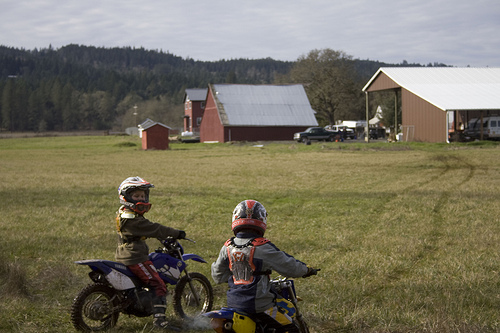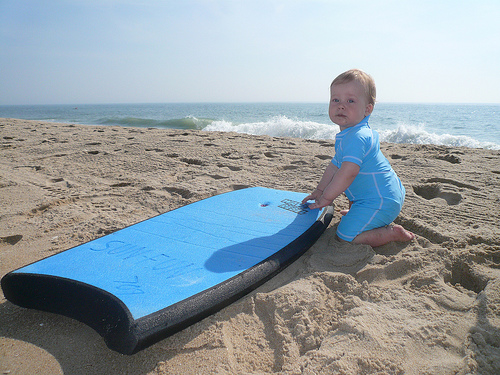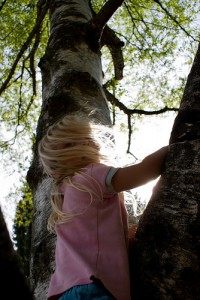While reading on the beach this morning (I’m back in California for the weekend) I watched as a young girl (she looked to be about two) ran towards the ocean’s shoreline.
“Bethany!” screamed what I could only assume was the girl’s mother. “Nooo!” She grabbed Bethany’s arm just as the little girl was about to plant a sneakered foot into the salt water. “That’s dangerous! You could have been knocked over by a wave!”
Bethany and I both looked from her mother’s panicked face to the calm bay behind her and seemed to share the same confused thought: What was she talking about? The ocean was as smooth as a lake! And the only “waves” were so small they couldn’t knock over an inchworm, never-mind a two-foot-tall human being.
The only logical explanation was that Bethany’s mom was insane. But at least according to a study conducted by Play England, fairly average, as well.
The study found that parents nowadays are more risk-adverse than ever before. So terrified are these parents of skinned knees or scraped shins that 50 percent of children in England are not allowed to climb trees and 17 percent are forbidden from playing tag. As the study revealed, children’s play these days is mostly confined to indoors or to supervised outings at the playground.

Apparently encouraging children to take healthy risks has become a thing of the past. Forget mud pies and dodge-ball, some parents won’t even let their children play outside alone, period.
This may prove to have a damaging effect on the next generation of would-be entrepreneurs. As Simon Woodroffe, a judge on the BBC show Dragons’ Den told The Sunday Times, “We need to encourage children to push themselves, to go beyond their limits, in order to build a nation of bold and confident people.”

And in a small village in Wiltshire, England, at least, parents are taking the necessary steps to do just that. In what the owner claims is England’s first “outdoor nursery” students at this preschool spend the majority of their day learning and exploring outside. They build forts and fires, learn how to count using rocks and bugs and make obstacle courses out of logs. While none of them are forced to remain outside, most of them chose to, coming inside only for lunch or snack time.
People have marveled at how the school’s concept of outdoor play is such a unique and novel educational approach, but as the school’s head teacher, Sue Palmer, points out, her methods are hardly new. The fact that her school is considered unconventional is just shows how “sterile” and restrictive society has become.

“My children know stinging nettles sting and that brambles are nasty,” she explains. “They know that fire is dangerous. Some nurseries say ‘Let’s go indoors, it’s raining’. But we say ‘Come on, let’s go and splash in the puddles.’ ”
I love this idea. And it’s no wonder; I was raised with much the same philosophy. When I was young my mother would drop me off at the bus stop with nothing more than a few dollars, a bus schedule and instructions to find my own way home. “See you in a little while!” she’d call out through the station-wagon window before leaving alone in a cloud of red dirt. I was 10.
While I’d occasionally day-dream or sleep past my stop and several times found myself trudging for 45 minutes along a winding stretch highway long after dusk, I quickly developed the sense that no matter what troublesome circumstance I found myself in, I could trust on my own intellect and strength to navigate my way out of them.
My mother has since commented (jokingly) that she ‘created a monster’ and wishes she’d placed a little less emphasis on self-reliance and a little more on self-discipline. I don’t think she ever imagined that I’d take my independence and run with it (literally) half-way ’round the world or that I’d feel so empowered I’d move abroad and then never come back (to date, I’ve lived in five countries).
I don’t have any children yet and it’ll be interesting to see if my opinions on this change once I do, but I think raising children to be brave, independent risk-takers is the greatest gift a parent can give. Because eventually kids are going to fall and they’re going to get hurt, no matter how many shin guards and elbow pads parents’ bundle up their bundles of joy in. It’s a part of life. So why not have them learn how to be resilient while they’re young? The falls will hurt a lot less when their five then when they’re fifty.
Back to the beach. After Bethany’s scolding, she eye-balled the water with a newfound apprehension and stayed several sand-castle lengths away from it for the rest of the morning. I imagined that a few years from now she’ll stand crying and screaming on the edge of a pool while her mother and swim coach try to coax her in. “Bethany!” Her mother will exclaim in exasperation. “What’s the matter with you? It’s just a pool!” By then she’ll have forgotten entirely about that one morning on the beach. She’ll be clueless to the fact that her attempts at keeping Bethany safe have in fact, kept Bethany chained to a lifetime of a fear.



[…] Raising Risk-Takers […]
[…] Raising Risk Taking Kids […]